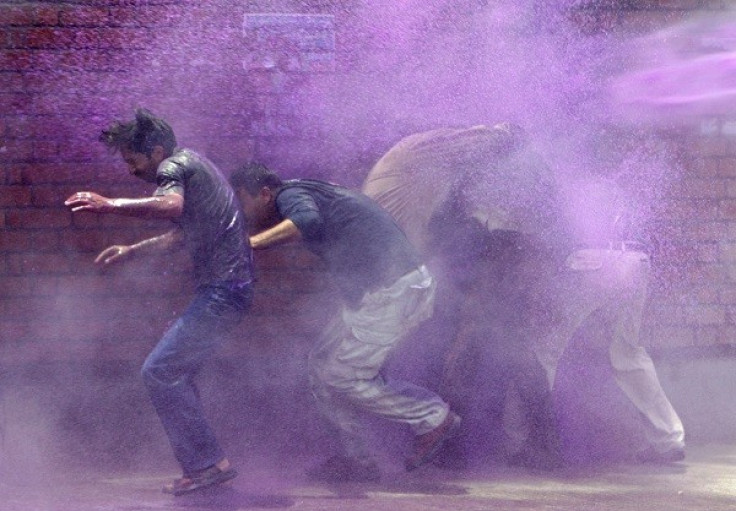Article 370: Election Opens an Indian Political Sore That Refuses to Heal
![A Kashmir protester flees as a tear gas shell fired by Indian troops explodes nearly during a 2010 demonstration [].](https://d.ibtimes.co.uk/en/full/433623/kashmir-protester-flees-tear-gas-shell-fired-indian-troops-explodes-nearly-during-2010.jpg?w=736&f=beef4c40a3bb5a841fef811160be34ed)
When the leaders of India's struggle for freedom were establishing it as a modern country, bringing together 600 separate princely states, there was one issue that was too hot to handle - the Muslim-majority, Hindu-ruled state of Kashmir.
Under the terms of constitutional proposals, the new state of Jammu and Kashmir would get special rights and a political identity not shared by other Indian states. The state would enjoy a great deal of autonomy and have a prime minister, while other states were ruled by chief ministers. Its legislative body was to be called "parliament" and the state was given a constitution of its own, unlike other states.
Provisions otherwise applicable to other states were not relevant for J&K: the government of India had practically no control over matters of J&K's state that did not fall within defence, foreign affairs, finance or communications. Another example of the special status of the state was that Indians from other states were not allowed to buy land in Jammu & Kashmir.
All these special rights and powers were accorded by Article 370 of Indian constitution. This controversial piece of provisional legislation was to bestow "temporary, transitional and special provisions" to the state of Jammu and Kashmir.
Sixty-five years later, the legislation remains vexing and occasionally triggers fiery national debates. The special status of Jammu and Kashmir remains a political football.
Most recently, prime ministerial candidate Narendra Modi said it was time to rethink the special constitutional special status awarded to Jammu and Kashmir. "Irrespective of whether it remains a part of the Indian Constitution or not, the time has come for at least a debate to find whether Article 370 has benefited the common man in Jammu and Kashmir," he said in a campaign speech.
Modi's party has long been sold on the demand for repealing the controversial Article, but Modi did not push his case that far. However, the focus on Modi is so intense that his utterances stirred up a lively debate.
Referring to the original idea of the special privilege being a temporary one, Modi asked the ruling Congress party: "We would just remind him [Prime Minister Manmohan Singh] one thing about [founding Prime Minister Jawaharlal] Nehru: He [Nehru] had said that Article 370 would get worn out with the passage of time and die. We ask Manmohan Singhji, why doesn't his government act on Nehru's wish?"
'Article 370 will be there forever'
Although Nehru always thought that Jammu & Kashmir's special status would erode away naturally over time, the state's founding prime minister, Sheikh Abdullah, staunchly championed permanent special rights. Today, many of the state's residents remain devoted to the vision of 'iron clad autonomy' which guided Abdullah 70 years ago.
"Nobody, whether Modi or anybody else, can ever revoke Article 370. The article is there and will remain there forever," said Omar Abdullah, the chief minister of the state. Omar, the grandson of Sheikh Abdullah, also challenged Modi for an open debate on the issue.
"I can't understand why you people are projecting the Article 370, which is the foundation stone of relations between Jammu and Kashmir with rest of India, as a provision which is creating a distance between Kashmir and Delhi," he added.
"The only way to abrogate it is by recalling the Constituent Jammu and Kashmir Assembly where the question of state's accession with India can again be reopened," Abdullah said. Given the original assembly has now expired, this would be impossible.
However, the legal opinion on the irrevocability of Article 370 is divided. Many refute the idea that only the state constituent assembly can revoke the special article. They point out that section 3 of the very same article empowers the President of India to declare it null and void.
The current bout of the Article 370 debate is imbued with a sectarian tinge, owing partly to Modi's infamous alleged role in the Gujarat carnage in which several hundreds of Muslims were killed early in the last decade. The political left attacked Modi for damaging the secular fabric of the country and the Congress accused the BJP of constantly changing its stance on the issue.
"First they wanted [the article's] abrogation, then they accepted its need and now in 2013, they want to debate on it. This is not doublespeak but triplespeak," Congress leader and Information and Broadcasting Minister Manish Tewari said of Modi.

Vibrant separatist movement
However, Modi and the BJP have stuck to the view that the separate status for J&K had led to a worsening of social and gender inequality in the state and encouraged the secessionist ideology.
For decades the Indian government forces have clamped down on a vibrant separatist movement in the state, with the heavy military presence even attracting the attention of international rights observers.
Indian politicians are on the same page when it comes to the inviolable nature of the deed of accession, by which the Indian-controlled part of Kashmir became part of India. The other half of Kashmir is controlled by Pakistan and the two nuclear-armed rivals have fought three wars, two of them over the disputed region.
For Modi and his party, reviving the debate on Article 370 is an imaginative political gambit; the underlying argument is that special status to a troubled state has spawned secessionism and separatism.
"Integration of J&K is an essential part of the ideology of the BJP. Separate status has led towards separatism and not integration," says Arun Jaitley, a prominent BJP leader and former federal minister.
Whether Modi's decision to rake over old and bloody ground pays off remains to be seen.
© Copyright IBTimes 2024. All rights reserved.






